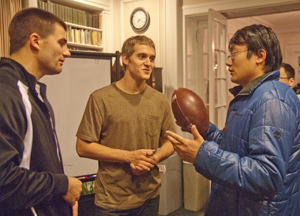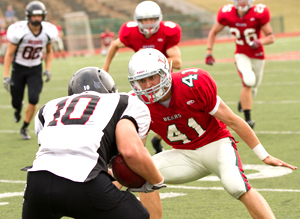When the St. Louis Cardinals won the 2011 World Series in October, the entire city rejoiced; for some, the win bordered on a near-religious experience. However, for many international students at Washington University in St. Louis – who didn’t grow up playing baseball – the series, and the hoopla surrounding it, was confusing.

That’s one reason why the Office of International Students & Scholars (OISS) recently put together a sports program – this one on American football – to help those students better acclimate to their home away from home.
“We know our students get invited to Super Bowl parties,” says Jason Marquart, international student adviser in the OISS. “They are really interested in baseball, football and the American sports scene.”
The main goal of the workshop was to give the students enough basic knowledge of the game that they could go to an NFL Super Bowl party and not be completely lost.
About 20 international students gathered at Stix International House Nov. 4 to learn basic rules and strategies of football. Their teacher was WUSTL linebacker Jonathan Paramore, a freshman in Arts & Sciences from Denton, Texas. Teammate Zach Lonneman, a running back and freshman engineering major from Harrison, Ohio, accompanied him.
Paramore, it turns out, was the perfect instructor. To find someone to lead the workshop, the OISS had reached out to WUSTL head football Coach Larry Kindbom, who knew of Paramore’s interest in Chinese culture.

Bear Moments Photography LLC
Paramore (No. 41) prepares to make a tackle in the Bears’ opening football game against Rhodes College.
Paramore is enrolled in “China in the Global Context,” a seminar that focuses on current events from the Chinese perspective, and in a course titled “Modern China: 1890s to the Present,” which explores political and cultural history.
In fact, Paramore is enjoying the classes so much that he applied and was accepted to study abroad at Fudan University in Shanghai next semester – an experience that is fairly atypical for freshmen.
There, he will be taking an intensive Chinese language course and studying such topics as U.S.-China relations, the Chinese marketplace and the culture, health and medical practices in contemporary China.
“It is pretty unusual for a freshman to study abroad their second semester, but Jonathan is very motivated,” says Priscilla Stone, PhD, assistant provost for international education and director of overseas programs in Arts & Sciences.
Paramore’s reason for leading the football workshop was simple: “When my coach put me into contact with Jason (Marquart), I jumped at the opportunity because I knew that when I go to China this spring, I will be in the same spot as these international students. Hopefully, someone will be able to explain to me a little about their culture,” he says.
Some of the questions posed by international students surprised Paramore. “They did ask a lot about the rules and what the purpose was, but they seemed more interested in why Americans enjoy football more than soccer or any other world sport.”
Esa Seegulam, a sixth-year graduate student in the molecular cell biology program from Trinidad and Tobago, says he was prompted to attend the workshop because of all the football fever in the U.S.
“Americans are as crazy about their football as Trinidadians are about their cricket,” he says. “Also, my friends are very passionate about the game, and I wanted to learn some more so that I could at least begin to understand their conversations. I now finally also understand what Sandra Bullock was talking about when she yelled at the coach in (the 2009 movie) The Blind Side to ‘run the dang ball!’”
Seegulam says he had all kinds of questions – the differences between the quarterback, the running back and the linebackers; why the teams are so huge when only a few players are on the field at any one time; and why there is so much stopping and starting.
“It was especially helpful to hear from an actual player, especially a younger one who was more likely to be patient with our misunderstandings,” he says. “The two guys did an excellent job.”
Marquart says the OISS plans to do more workshops on U.S. sports — an idea Seegulam welcomes.
“I think it should become a regular event, both for international students and their American friends,” he says. “It made me appreciate the sport, and the passion behind it, so much more.
“I can’t underscore enough how well those young men handled themselves. They should be very proud and WUSTL should be very proud to have them as ambassadors for their team.”